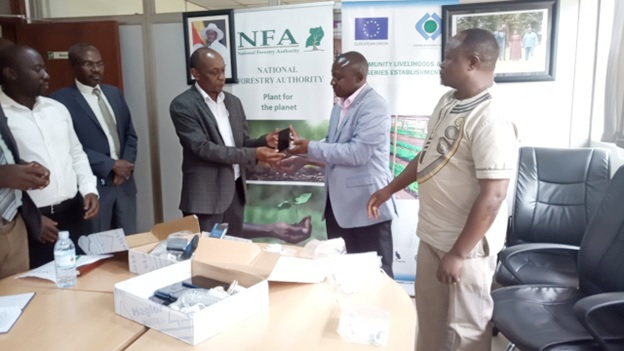
KAMPALA, Uganda: On July 1, 2022, WCS presented smartphones to the National Forestry Authority (NFA) for use in Spatial Monitoring and Reporting Tool (SMART)-based law enforcement and forest protection. The donation was made in support of a project called “Restoring and conserving degraded fragile ecosystems for improved community livelihoods among refugee and host communities of West Nile Region and the Mid-Albertine Rift” with funding from the European Union (EU) through the Uganda Biodiversity Fund (UBF). The ability to collect data, evaluate it and report on it helps forest patrol teams, forest supervisors, and managers to respond to threats in real-time. In NFA’s Central Forest Reserves (CFRs) of Mt. Kei, Kulua, Lodonga, Mt. Watti, Barituku, Otrevu, Enyau, and Suru in Kei and Maracha sectors of the West Nile Range, the phones have been customized to support the monitoring, assessment, and management of forest patrolling activities.
More than 90% of Ugandan households, including those of refugees, rely on these forests as their primary source of biomass energy. In addition to protecting water catchment areas, and promoting tourism, employment, and biodiversity conservation, these forests also provide building materials and support small-scale forest-based businesses. The value of forests will be realized with the help of SMART technology, in addition to other initiatives to increase tree cover and efficient use of fuel wood both within refugee hosting communities and refugee settlements in Yumbe and Terego refugee hosting districts, hence preventing detrimental environmental effects, such as climate change, on both displaced people and host communities.
WCS is supporting NFA in transforming forest management using SMART technologies to successfully safeguard Uganda’s forest resources. “The SMART technology plus the Global Forest Watch Application and remote sensing approaches give real-time updates on forest degradation,” said Dr. Simon Nampindo, the WCS Country Director.
Tom Rukundo, the NFA Director of Natural Forest Management, expressed his gratitude to WCS, EU, and UBF for providing the resources that would make the five-day SMART training offered to NFA’s supervisors, sector, and range managers in late May 2022 useful. He said, “These technologies will be used by the forest patrol teams and managers to create actionable data to inform decision making in the allocation of resources and enhancement of forest management”.
In order to safeguard animals and natural spaces in national parks and, most recently, Uganda's forestry, which contributes about 8% to the country's gross domestic product, WCS, one of the nine active members of the SMART partnership, is advocating the adoption of the SMART technology in these areas.